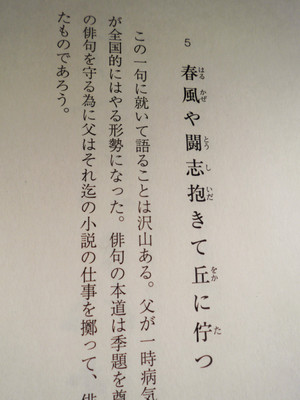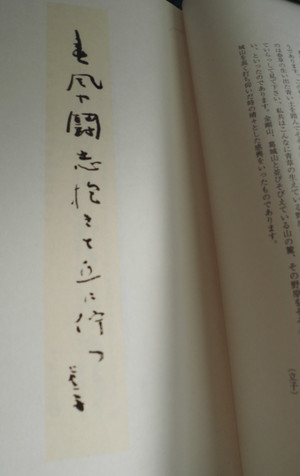100 HAIKUs of TAKAHAMA Kyoshi (1~20) (Revised)
(HAIKU of Kyoshi Takahama, translated by Satoshi Kinoshita)
The pictures show a part of Pages 8 and 9 of "自選自筆 虚子百句" published by 岩波書店.
(harusameno ikohniomoshi koigoromo)
heavy on a dress-rack
clothes of love_
spring rain
(2)怒濤岩を噛む我を神かと朧の夜 (M29. 1896年)
(dotoh iwaokamu wareokamikato oboronoyo)
as if thinking me a god,
surging waves bite the rock_
hazy moon night
(minomushino chichiyotonakite hahamonashi)
a bagworm chirps
papa papa,
without mamma, either
(Shikiyukuya juushichinichino getsumeini)
Shiki passed away
in the moonlight
of the 17th day
(akikazeya ganchuunomono minahaiku)
autumn wind_
anything you see
could be a HAIKU
(arutokiwa tanifukakuoru gebanakana)
'gebana' flowers,
taken deep in a valley
at a cetain time
(7)刑罰の石を背負うて夏野かな (M38. 1905年)
(keibatsuno ishioseoute natsunokana)
carrying a stone of punishment
on one's back_
the summer field
(kaimamiru koushokumononi kusakanbashiki)
the grasses fragrant
to a lecherous man
peeping in through the hedge
(9)桐一葉日当りながら落ちにけり (M39. 1906年)
(kirihitoha hiatarinagara ochinikeri)
a leaf of paulownia
fell,
with the sunlight on it
(10)曝書風強し赤本飛んで金平怒る (M41.1908年)
(bakushokaze tsuyoshi akahontonde kinpiraikaru)
strong a wind at book-exposing,
a red-covered storybook blown down,
exposing the hero Kinpira angry
(11)凡そ天下に去来程の小さき墓に参りけり(M41. 1908年)
(oyosotenkani kyoraihodono chisakihakani mairikeri)
Under heaven,
I visited such a tomb
as small as I heard of Kyorai.
(12)(13) 霜降れば霜を楯とす法の城 (T2. 1913年)
(shimofureba shimowotatetosu norinoshiro)
if there is a frost,
the frost be a shield_
the temple of laws
(14) 春風や闘志抱きて丘に佇つ (T2. 1913年)
(harukazeya tohshiidakite okanitatsu)
spring wind_
I stand on the hill,
my heart full of fight
(15)囀や山かけて売る土地広し (T2. 1913年)
(saezuriya yamakaketeuru tochihiroshi)
(Translation A)
running around the hill,
broad the lot sold_
chirps of birds
(Translation B)
broad the lot
sold by taking a chance_
chirps of birds
(Translation C)
broad the lot
sold with a hill behind_
chirps of birds
(Note)
In this haiku, "山かけて" (yamakakete) is a pun, meaning "run", "take a chance", or "hang".
(kononochino kofunnotsukihi tubakikana)
after this,
lasting time of the ancient mounds_
the camellias
(17) 歌人祭らず俚人ただ祭る社あり (T2. 1913年)
(kajinmatsurazu satobitotada matsuru yashiroari)
(on Hitomaro death-anniversary)
a shrine,
no poets worship it,
villiagers only worship it
(18) 一つ根に離れ浮く葉や春の水 (T2. 1913年)
(hitotsuneni hanareukuhaya harunomizu)
the spring water_
the leaves float aloof,
grown from single roots
(funekishini tsukebayangini hoshihitotsu)
the boat reached a shore,
there a willow,
thereabove a star
(20) 秋来ればいつもあはれにきぬたかな (M24. 1894年)
(akikureba itsumoawareni kinutakana)
autumn has come,
always pathetic
'kinuta' fulling
(Note)
Click here to see all of the 100 haikus of Kyoshi Takahama.

